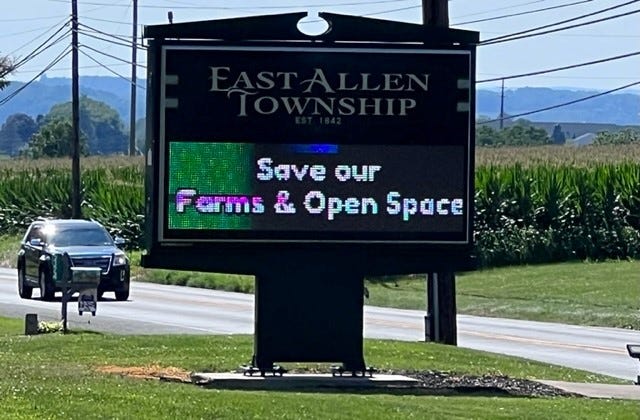East Allen latest Lehigh Valley township to dedicate tax for land preservation
Voters approved referendum question in May 17 primary

East Allen Township became the latest Lehigh Valley municipality to commit money from the earned income tax to preserve farms and undeveloped land.
Township voters overwhelmingly approved a referendum in the May 17 primary to add 0.25% to the EIT, with the money going to help buy land to prevent it from being developed for homes, businesses or warehouses. Eighty percent of township voters (998-250) voted for the proposal.
About a dozen townships in the region now have land perservation programs through the earned income tax.
In Northampton County, voters in the townships of Bushkill (2005), Lower Mount Bethel (2006), Lower Nazareth (2019), Moore (2005), Plainfield (2007), Upper Mount Bethel (2007) and Upper Nazareth (2019) have approved similar ballot questions. Williams Township voters approved raising the EIT for open space in 2004 but then rescinded it in 2014.
Lower Saucon Township voters approved an increase in the tax in 2011 for five years and in 2016 for another five years; the tax expired at the end of 2021. However, the township has more than $10.8 million collected from the tax over the years to buy land or maintain existing preserved land, according to the township’s comprehensice financial report for 2021. Last year, the township bought 8.9 acres, bringing its total acreage preserved to more than 750.
In Lehigh County, voters in the townships of Lower Macungie (2021), North Whitehall (2019), Upper Milford (2016) and Upper Saucon (2021) approved an increase to the EIT to preserve open space, according to a report from the state Department of Conservation and Natural Resources, Bureau of Recreation and Conservation.
Statewide, municipal open space referendums have raised $819.6 million for conservation in Pennsylvania since 1996, when a state law first allowed muncipalities to earmark taxes or borrow money to keep land from development, and 2021. Ninety-two muncipalities, with a large majority from the eastern part of the state, have participated, the report said.
Most open space and farmland preservation efforts are funded by the state and counties. But municipalities buying land on their own or assisting county and state efforts is helpful, said Geoff Reese, director of environmental planning at the Lehigh Valley Planning Commission, where he has worked for 42 years.
“This allows communities to go beyond what the counties and state can do,” he said. Townships can also contribute the difference between the appraised value of land and what the county and state can commit to buy it. They may be “able to acquire properties that may not [otherwise] be acquired.”



